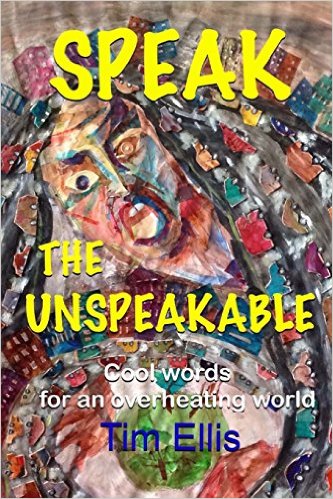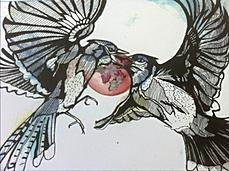Speak the Unspeakable by Tim Ellis
– Reviewed by Simon Zonenblick –
Dead seas.
Unbearable heat.
No wildlife, no trees.
Nothing to eat.
Disease.
Defeat.
This apolcalyptic passage from the poem ‘Six Degrees’ is just one of a great many unrepentantly grim forecastings in Tim Ellis’ Speak the Unspeakable – a doom the poet feels is inevitable, because even though ‘All of us can make a thousand lifestyle changes / to stop emitting carbon; cut back and conserve’ the sad fact is that ‘most of it’s in vain when world finance arranges / to sink humongous stakes in the search for new reserve.’
I agree with Ellis when he fumingates about
the rising seas, the sliding mud,
the farmers fled to city slums,
forced from fields by drought or flood
and how
the world is set to boil
from coal and gas and oil
but not when he states that
everyone stays silent
like its something strictly private.
Nobody wants to talk about the climate!
Who does Ellis mean by nobody? He cannot be referring to the media, to political parties, to government departments or those responsible for running scientific and educational institutions, to charities or even to many businesses. Successful applications for subsidies and support, from Arts Council grants to Local Authority funding, often depend on how vigorously those applying demonstrate their commitment to causes like ameliorating climate change. It is frequently discussed in televised political debates, and in student politics and activism. Nor can Ellis mean those who deny the climate’s problems, or humanity’s culpability for them – such people, as indeed parodied in this collection, are usually self-appointed “experts” on the climate, and full of revisionist theories about it. They do talk about the climate, and are unafraid of doing so. While I am sure Ellis would often (in some cases rightly) berate their apparent hypocrisy, there is barely any public figure (apart from those who purposely cultivate a belligerent or “controversial” image) who would publically denounce concern for the climate. Those who deny or seek to downplay human impact are often quick to insist that they care passionately about the planet, even while doubting official scientific consensus. In ‘How to be a denier‘, Ellis baits the unconvinced to ‘Claim that every scientist’s a liar’ and wastes no time in listing prominent proponents of his views, from Al Gore to David Attenborough to Bill Oddie. If “every scientist” supports his point of view, Ellis can hardly claim it is a controversial one, much less “unspeakable.” Climate change deniers and sceptics often present themselves much as he presents himself, as a lone voice in the wilderness, defying the Establishment.
The book begins with the author introducing himself:
Hi, I’m called Tim.
I’m writing this today
to make you all uncomfortable,
to rock your piece of mind.I’m here to shock you,
here to mock your carbon hungry ways.
Expect no civil platitudes,
no reassuring lies.
I’m here to whack your attitudes,
dynamite your lassitude.
And so on. The problem being, of course, that having warned us in advance, the poet has anaesthetised us to his intended shocks. It is worth wondering at whom the opening lines are levelled – who does Tim Ellis see as the most likely readers of the book? Designed with a loud, slightly Cubist-style cover, its title splashed in garish yellow, it is virtually impossible that the collection will blast its way to the front of Richard and Judy’s Book Club, or the Christmas lists of oil company executives. Climate sceptics and vocal opponents are unlikely to find themselves rushing to buy copies, while those members of the public who are uninterested in environmental matters would simply pass it by. It is likelier that Speak the Unspeakable will be read for the most part by those who read poetry collections generally, and those who share the author’s views on climate change. Readers of poetry, although this is a generalisation which will undoubtedly be challenged, are for the most part intelligent people not known for hostility to environmentalism (the natural world looms large in the history of poetry from antiquity to the present day), while the latter are in full agreement from the word go, so will not be shocked or shaken by the author’s “slamming” and “haranguing.”
It is not my intention to deny the obvious sincerity of Tim Ellis’ beliefs, nor to question their accuracy. I, too, despair at how ‘The air got choked by carbon we expelled’ and echo the sentiments of poems like ‘Fracking Hell’, with their barely contained rage against waste and greed-driven destruction. But at times I feel that, as poetry, some of the writing preaches to the converted, and some borders on the prosaic. When Ellis tells us
its staggering to learn
our two degree target means we can’t afford to burn
a fifth of what already has been found
it comes over more as lines from a report or article, especially in the inclusion of words like “target”, which immediately induce an unintentional yawn.
Speak the Unspeakable, in which Tim Ellis articulates angrily the very frequently speakable, is an impassioned indictment of environmental pillaging, but gives too much vent to its author’s repetitious and exclamatory style. In ordinary correspondence, in emails, texts or letters, the use of several exclamation marks may signify extreme amusement or warm-hearted affection – but in poetry, where every single word, letter and symbol takes on an illuminated significance, I am not sure precisely what is gained from their inclusion – nor of sentences all in capitals, or jokes in poor taste, such as when he promotes tree planting as a form of masturbation for tree-dophiles.
However, there are poems in this collection which manage to be both powerful arguments for Ellis’s cause, and pieces of writing which challenge and surprise the reader. ‘Rhino swansong‘ is one such poem. With its tragicomic title, it presents a view of plundering humans from the point of view of a rhinoceros:
Stuff yourselves you rakish apes, carousing,
smashed on greenhouse gases, with your gross
physiques ensconced on barstools turned from trees
that we’d depended on for shade and browsing.You looked on us as merchandise. A horn.
Mindless hulks. You gunned us down, despising
rhinos for existing…
Ellis is more effective when writing in the second person, his narrators somehow firing off a rage that, to me at least, seems more whole and lucid than in his first person exclamations. Not that the rhino’s lament is in any way reserved:
We’ll exit with our dignity while you flounder,
slopping in a carbon midden pit,
mired with your machines. You’re pickled, sousing,
drowning in a sump of your own ****.
Quite why Ellis has chosen to asterisk the last word is beyond me, as it appears unveiled elsewhere – but apart from that dampening of the blow, this is fiery and unapologetic, and represents the sort of bottled anger which Tim Ellis can write powerfully.
Lagoons of Sadness is another such poem:
Cracked mud. Black trees. Dead grasslands.
Vast lagoons reduced to puddles.
Jungle Babblers scuff beside the pathways.
A few ducks dabble.But I remember Bharatpur before,
in ’89 – the wetlands shimmering.
A haunt of Sarus Crane and Painted Stork
where duck counts peaked in millions,
Reminding us that his theme is of course global warming, and the malaise of a planet, he takes us on a journey back to the India of that shimmering 1989, where a ‘young man’ (presumably Ellis) ‘stood here once’, and was
bedazzled … by dancing cranes and diving snakebirds,
and coming home to England from his travels
resolved to make his life’s workchampioning the miracles he’d found there.
‘Access Weekend’ is the wry, sad story of a divorced father driving his two children through ‘blizzards of thistledown’ on a day out in the country. It presents the characters through a prism of witty observation – at times clichéd, yet partly because of this, acutely believable:
iPod plugged, young Victor’s
muttered not a word since my divorce.
Grace is up front. She carps,
“Dad, why d’you drive this Chelsea Tractor?”
Thinks she’s going to save the world of course
since reading a bit of ecology for GCSE.
I hang a left and bark,
“You think I never cared? You’ll see!”
I am tempted to wonder whether Ellis is drawing us intentionally into some Shelleyan, dystopian nightmare. Young “Victor” with his iPod may seem innocuous enough, but he is in fact a Frankenstein’s monster of the modern world: innocent victim of the gradual degradation of a beauty being systematically shrivelled and narrowed, the iPod surely a stinging symbol of the depletion of culture – for what is such a device if not the audible equivalent of being fed gourmet food through an intravenous drip? At first glance, we may detect from Victor nothing but the typical teenage taciturnity, but Ellis’ skill here is his sleight-of-hand – the quick, dismissive way his father observes his son’s wordlessness. Perhaps the boy has literally clammed up altogether? Or could it be that he reserves this lack of speech only for his selfish father – who regards the end of his marriage as solely “my” divorce?
Where the son keeps schtum, Grace is “up front” in more ways than one. In questioning his choice of vehicle, she has, unlike his silent son, unnerved her father – who responds with prickly, defensive sarcasm. ‘Thinks she’s going to save the world of course / since reading a bit of ecology for GCSE’ could be a sneer straight from the mouth of a guffawing Jeremy Clarkson. However, having got this off his chest (albeit only in his mind), the father’s verbal answer is all the more sincere. When he “barks” and promises – threatens – to demonstrate to his idealistic daughter the very fact that he did, once, care we suspect that this brash dad may be about to reveal something of his own idealism, as the trio arrive in a car park ‘chock-a-block / with college vans and bleasting sixth-form students / who can’t connect their smartphones out of town.’ Here again is the simmering distaste for technology, and distrust, even disdain, towards the young. ‘And how the valley’s changed, Dad tells us, its swathed in trees!’ Given his curt tone, it is not immediately clear whether he percieves this to be a good or bad thing, but in a rare moment of self-awareness, he then explains:
Parked, I zap the locks
and brashly boast, “I planted some of these.”
Instantly our opinion alters – even down to the honest admission that he only planted “some” of the trees. The vision of a natural world that he once helped to protect evokes a mood of reflection rather than of triumph:
Before I met their mum
I’d worked a winter skidding down the shitty
shee-eroded fells,
volunteering overseeing some
work-experience youths from the inner city,
stalking spindly whips in plastic tubes.
Icy water welled
from sour mud and squelched inside our boots.
Apart from one or two questionable line-breaks, I find this section illuminating and free-flowing. The father’s emotional detachment is still evident (his ex is acknowledged as “their mum” but not named, perhaps a kind of emotional self-defence) yet the sudden swoop into natural language, the unexpected swear word, the description of physical feeling, all evoke intimate sincerity. I like how Ellis maintains that slight sense of stand-offishness by having the narrator term the youngsters “youths” instead of the much more commonly used “kids” – the latter being a sloppy, patronising word used by out-of-touch older people who think they are in tune with the young, the former unashamedly disapproving, in the style of Dad’s Army’s Captain Mainwaring or some snobbish Edwardian Headteacher.
In the next stanza, there is again no attempt at cosying up to the “youths”:
The worst was a lad called Tony.
Tough nut from a rough estate, shaved head
and manner of a primate.
“These sticks ain’t trees!” the boy was constantly moaning,
stabbing the soil. In dull grey eyes I read
a future of prison and drugs, sure as death.
I talked about the climate,
carbon and food webs, aware that I was wasting breath.
I can just about imagine a left-wing idealist discerning “a future of prison and drugs” in the eyes of such a youngster, but never using words like “worst” or “Tough nut”. They would say that Tony hailed from a “troubled estate” or a “challenging” background, and rather than criticise his manners (although the comparison with a primate need not be read as “offensive”, given that we are all from a selfsame apish lineage, highly intelligent and adaptable), would dwell on the social and economic factors which they felt had levered him into a life of deprivation. But by having his narrator describe the lad in no-nonsense, at times judgmental, terms, Tim Ellis has distilled a perfect sense of character, and delivered a slab of plausible realism within this poem that would not go down at all badly as part of a short story.
‘Fine ideals got bruised’, diagnoses Dad as
I flounder, lost, confused.
Songbirds flute in the leaves above but nothing
marks where we’d interred our gammy trees.
“Daaad!” blurts Vic, “You plonker!”
And then I see. We laugh as a family.
This touching scene is rendered painfully moving in the context of the father, depicted warts-and-all, and his regretful reflections on a well-intentioned past. On this occasion, the stretching of Dad into “Daaad” is heart-warmingly appropriate, strongly believable as the voice of a child or teenager. It rounds the poem off nicely, yet this effect is sweetened all the more by the unexpected, poignant and cathartic ending, as
Ambling down the hill
we meet the students clustered round their teacher.
It’s like he’s cast a spell:
the kids are rapt. The man expounds with skill
on the interdependence of trees and woodland creatures.
This bloke loves his work. “Look at this … I’ll show you…”
Voice rings a bell.
I go up to the man. “Don’t I know you?”
It is this sort of writing which raises Tim Ellis’ poetry above the standard set by some of the earlier poems in this collection, and which makes Speak the Unspeakable more than worth the effort of sticking with.





